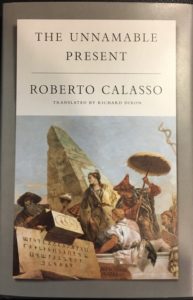The Unnamable Present, by Roberto Calasso, is curious and compelling.
 The first half is about the features which render the post-millenial age “unnameable.” In it, Calasso connects otherwise disparate strands of thought, in very interesting ways. The presentation of these series of connections together characterize the unnameable present. In the second half, Calasso presents a series of short, dated entries, all between 1933-1945, the period from Hitler’s party’s rise to power, until its demise. Some entries appear to be Calasso’s own thoughts, some appear to be recollections of identified others, but recorded in current times, and some appear to be journal entries or other observations, made then-contemporaneously, by identified literati of the period. The final few pages are about writings of Beaudelaire (1821-1867) which Calasso takes to have presaged the destruction of the twin towers on 9/11, bringing an exclamation point to his thesis.
The first half is about the features which render the post-millenial age “unnameable.” In it, Calasso connects otherwise disparate strands of thought, in very interesting ways. The presentation of these series of connections together characterize the unnameable present. In the second half, Calasso presents a series of short, dated entries, all between 1933-1945, the period from Hitler’s party’s rise to power, until its demise. Some entries appear to be Calasso’s own thoughts, some appear to be recollections of identified others, but recorded in current times, and some appear to be journal entries or other observations, made then-contemporaneously, by identified literati of the period. The final few pages are about writings of Beaudelaire (1821-1867) which Calasso takes to have presaged the destruction of the twin towers on 9/11, bringing an exclamation point to his thesis.
In the present age, anxiety is ubiquitous, but it no longer prevails. What prevails is “a lack of substance, a deadly insubstantiality. It is the age of the insubstantial.” Secularism leaches meaning. Terror follows because terror guarantees meaning. The rise of terror coincides with the explosion of online pornography in the 1990’s. Death (the object of terrorism) trumps sex, for meaning. Sex was the remaining locus of meaning in the West, and it is eroded by porn. Terrorism — death, and particularly death by chance — is the new locus of ultimate meaning. The purpose of this blood sacrifice is to reject every aspect of the West.
Despite Calasso’s style in minimizing argumentation in favor of showing moods and tendencies, the narrative is quite convincing of societal trends that have led from that day (1933) to this (the new millennium). “Normality” has replaced the norm. The more procedural regularities multiply (and here you can read, especially, computer algorithms dictating procedures inflexibly) the more the realm of automata expands. Automation becomes the new normal, except it’s even worse than that, because the concept of “normal” itself is absorbed into a state we regard as “normality:” not merely the usual state of affairs, but normal-as-such, a dehumanizing default to a view of life as system rather than organic human experience.
There has been a project of deification of society itself, articulated for example by Emile Durkheim, and accepted now as larger and more significant than the sum of the teeming individuals who constitute it. The sustained project of removing the divine has resulted in a secularism which is the rigorous exclusion of God in the deified society, resulting in something distinct from the casual or pagan atheism of ages past. It has become doctrinal itself: “a way of thought that adheres to its own principles no less than the religions that have gone before it. And places its faith no longer in transcendent beings but in a body described as humanity.” The resulting new materialism proceeds blithely oblivious of the resulting negation of free will, which the new secularism requires.
In the unnameable present, knowledge is replaced with information, and we wrongly conflate the two. A knowledgeable person is diminished to a repository of information, so that personhood itself is diminished, no longer a self, or an “I,” functioning instead like the unaware computer I type on, or the unaware page which yet holds these words. Dataism, which I wrote about once while channeling Roger Scruton, is the increasingly bold materialistic view that there is no knowledge as such because there is no “I” to be knowledgeable – all is data. Calasso cites Yuval Noah Harari (as did Scruton) who asserted the dogma that “experiences are valueless if they are not shared, and that we need not – indeed, can not – find meaning within ourselves. We need only record and connect our experience to the great data flow, and the algorithms will discover its meaning and tell us what to do.”
The second section of Calasso’s book consists of short snippets about the realities of Nazi power, and especially about the intended elimination of the Jews. These observations widen out as time progresses so that we’re led to see the mind-set that gave us first the Cold War and then the age of Terror. We’re left to make the connection between Nazism as a project of human destruction, and Islamic terrorism. But in addition, the unnameable and insubstantial present which invites the terror.
The third section closes the loop, you might say, reminding us of 9/11, and then circling back to Beaudelaire’s 19th century unease about currents which he thought might bring us to a day like this. Calasso’s point, I think, is that the accumulation of these little negligences and petty hatreds and anxieties and self-absorption point inexorably to the age we live in now, beyond the all-in self-worship of National Socialism, and the wary and weary cynicism of Cold War society, to the advent of an “unnameable” age that is “shapeless, rough, and ever more powerful. Elusive in every single aspect, . . .”
God willing, this book will be a re-read for me, in a few months’ time.
